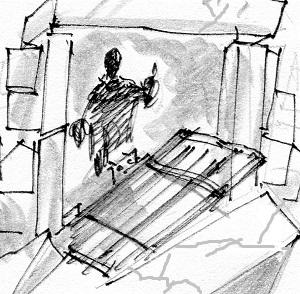

“It is better for you that I go…” (John 16:7).
An earthquake at midnight that frees prisoners is clearly a metaphor for the ongoing power of the resurrection. Luke's Acts of Apostles is intent on retelling the Gospel story of Jesus in the life of the early church. What he did -- preach, heal and raise from the dead -- the disciples also do. When Paul and Silas are beaten and jailed for preaching about Jesus in Philippi, the foundation of an old reality shifts and breaks open to release new life and freedom. (Acts 16:22ff). The world does a somersault. The Gospel cannot be chained, and the new creation revealed in the death and resurrection of Jesus cannot be turned back.
Jesus prepares his apostles for his departure: "It is better for you that I go, because when I go, I will send the Advocate to you.” Jesus' absence is necessary to open up the space within them that will receive the Holy Spirit. As music needs silence, so love needs longing. We say that "absence makes the heart grow fonder." In fact, couples often do not know they are in love until separation occurs. It is the ache of absence that reveals just how important another has become in their lives. Loneliness becomes the space within the heart that holds the mutual love that unites them.
Grief, loss and introspection, the deepest unfinished prayer the disciples have ever endured in the dark interval after Jesus is gone, is what becomes the foundation of the Church at Pentecost. He returns to them in wind, fire and an earthquake.
We who believe in Jesus have made his life, death and resurrection the narrative of our own existence. We are about to enter the liturgical time between the Ascension and Pentecost. Jesus must go away in order to return in the Holy Spirit. It is sacred time of waiting and longing before the birth of something new and wonderful.
Advertisement




